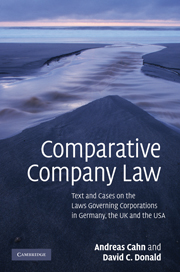 Comparative Company Law
Comparative Company Law Book contents
- Frontmatter
- Contents
- List of figures
- List of tables
- Preface and acknowledgments
- Glossary
- List of abbreviations
- Table of cases
- Table of legislation
- PART I The essential qualities of the corporation
- PART II The corporation and its capital
- PART III Governing the corporation
- SUBPART A The management
- 10 An introduction to the board and its governance
- 11 Directors' power to represent the company
- 12 Directors' duties of loyalty, good faith and care
- 13 Judicial review of management decisions (the business judgment rule)
- 14 Executive compensation
- 15 Directors' duties in listed companies
- SUBPART B The members
- PART IV Corporate combinations, groups and takeovers
- References
- Index
10 - An introduction to the board and its governance
from SUBPART A - The management
- Frontmatter
- Contents
- List of figures
- List of tables
- Preface and acknowledgments
- Glossary
- List of abbreviations
- Table of cases
- Table of legislation
- PART I The essential qualities of the corporation
- PART II The corporation and its capital
- PART III Governing the corporation
- SUBPART A The management
- 10 An introduction to the board and its governance
- 11 Directors' power to represent the company
- 12 Directors' duties of loyalty, good faith and care
- 13 Judicial review of management decisions (the business judgment rule)
- 14 Executive compensation
- 15 Directors' duties in listed companies
- SUBPART B The members
- PART IV Corporate combinations, groups and takeovers
- References
- Index
Summary
The benefits and risks of central management
Delegated authority and agency costs
In the first nine chapters of this text, we have looked closely at three of the essential characteristics of stock corporations. By incorporating, a stock corporation obtains legal personality. In this respect, certain requirements – in particular adequate capitalization – must be met in order that shareholders receive the benefit of limited liability. A company may structure its freely transferable shares in classes having characteristics that meet the needs of its shareholders and itself. In this part of the text, we will begin to look closely at the feature of the corporation that generates the bulk of litigation and scholarly investigation in corporate law: the delegation of power over the company's operations to a central management. This delegation of power to a central management is a characteristic of all large corporations. Power is delegated both because effective decisionmaking requires concentration of authority in a relatively agile group of persons and because shareholders either do not want to manage the company or do not have the necessary skills to do so. The result is that power passes from its residual owners (the shareholders) to persons who act on mandate from the shareholders to perform certain duties (the management).
The delegation of one's power and authority to another person – whether in the context of a simple principal/agent relationship, the somewhat more complex owner/manager relationship, or the citizen/minister relationship characteristic of representative democracies – creates the risk that the person receiving the delegated power will be disloyal or incompetent.
- Type
- Chapter
- Information
- Comparative Company LawText and Cases on the Laws Governing Corporations in Germany, the UK and the USA, pp. 299 - 311Publisher: Cambridge University PressPrint publication year: 2010


